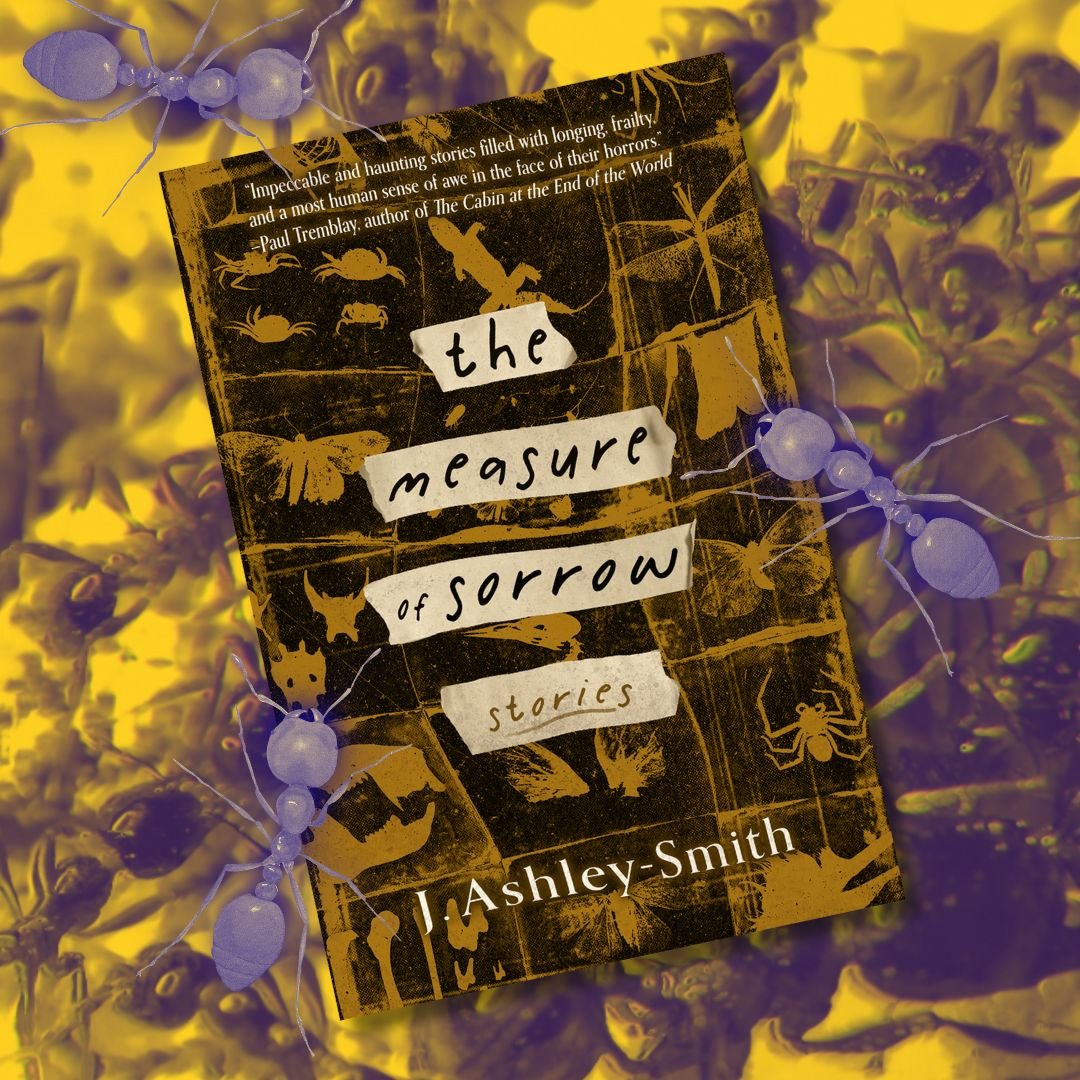Shirley Jackson Award-winning author J. Ashley-Smith’s first collection, The Measure of Sorrow, draws together ten new and previously acclaimed stories of dark speculative fiction. In these pages a black reef holds the secret to an interminable coastal limbo; a father struggles to relate to his estranged children in a post-bushfire wilderness; an artist records her last days in conversation with her unborn child; a brother and sister are abandoned to the manifestations of their uncle’s insanity; a suburban neighborhood succumbs to an indescribable malaise; teenage ravers fall in with an eldritch crowd; a sensitive New Age guy commits a terminal act of passive-aggression; a plane crash opens the door to the Garden of Eden; the new boy in the village falls victim to a fatal ruse; and a husband's unexpressed grief is embodied in the shadows of a crumbling country barn. Intelligent and emotionally complex, the stories in The Measure of Sorrow elude easy classification, lifting the veil on the wonder and horror of a world just out of true.
Intrigued? Read on for an excerpt from The Measure of Sorrow!
From “The Further Shore”
Renault was out beyond the littoral when the fear bloomed.
Drifting with the currents, he bobbed above the reef. The sun warmed his back, cast a spangled net of iridescent white on the ocean floor. The only sound was the rasp of his breath in the snorkel, the faint pop pop of unseen creatures in the labyrinth of black coral below.
The black reef, with its oil-slick glimmer, stretched as far as he could see. Crooked spires. Towers that jutted and curled like obsidian fingers. Was it a trick of distance or movements of the water that made the coral writhe and sway? It was profoundly hypnotic, drew him out over ever-deeper waters, farther from the shore.
Renault had noticed the pattern two days before. It was madness to think there should be order out here, among these chaotic accretions; yet there it was. The deep grooves of shadow that drew together, converging like vast, curved spokes around a distant axis. It had been too late to explore that first afternoon, and yesterday had been overcast, the light too diffuse to make out any detail in the reef. This morning he had woken early, determined to swim out to the point where those dark channels met.
His excitement mounted as each stroke brought him closer to the center. The crevasse he was following narrowed, its arc tightening around smooth plates that resembled the petals of an obscene black flower. These segments overlapped uniformly, interlocking at the hub around something that glinted, that refracted light in soft, shimmering rainbows. It looked very much like a pearl. A pearl the size of a boulder.
Renault strained to make it out, unable to believe what he was seeing. But his mask had fogged and his sight was confined to a blurred rectangle. Just outside this frame of vision, he caught a movement.
He spun, scanning the water around, below.
There was nothing. He could see nothing. But his back tingled, his chest tightened. Something was there. Something.
Renault became suddenly aware of the depth of water beneath him, the distance to dry land, the darkening sky. The shadows within the black landscape were spreading, swallowing the reef. And within them—
Fear propelled him. He turned shoreward, beating at the waves with his arms, with his fins, battling the currents of the outward tide.
Though every muscle screamed, he did not stop thrashing until he felt the sand beneath him.
—
The reef obsessed Renault. For days now he had been coming here, following the water’s edge to where the salt-and-pepper sand turned gritty black. To where he had first found the shells.
He thought of them as shells only because he had no better word to describe them—organic forms that twisted and coiled without order, without repetition, conforming to some other geometry. Some ribbed, some spurred, some perfectly smooth, the shells were all black when dry, but iridesced when submerged in water, revealing shifting patterns of color. All alluded to the familiar, yet all eluded classification. No two were alike.
He was quick to intuit the connection between the shells and the black sand, but the existence of the reef was a hypothesis he was unable to test without proper equipment. A search of the shack had revealed a mismatched pair of flippers left by a past occupant, but it took hours of scavenging along the coastline before he found a mask, and weeks before a snorkel washed onto the shore.
To stave off the madness of impatience, Renault killed time collecting shells. He studied them, took them back to his room in secret, always careful to hide his discoveries from the others. From Benson. And from Webb.
After weeks of frustrated speculation, he finally swam out beyond the breakers. When he dipped his head beneath the waves, caught sight of that landscape of black sculptures, it was the closest to pure joy Renault had felt since he first awoke in the shack.
—
The wind had picked up, blew the tang of saltwater and rotting kelp in from the sea. Renault’s stomach growled.
He knew he did not need food, yet the old triggers persisted. Mealtimes were the worst.
He walked north with the sun low behind the mountain, with shadows reaching seaward across the wasteland of scrub and salt grass. The ocean was marbling blue and golden red, a web of light that danced toward the horizon and the chain of hulking black ships. His feet made impressions in the moist sand, a trail of prints that faded beneath the lapping tide. He had stayed out too long, left barely enough time to make it to the shack before dark.
Renault quickened his pace, muttering, cursing. He was raging at his irrational fear, elated at the discovery of the black flower and the pearl. And his excitement made him rage all over again, impatient to be back out over the reef.
Among the tangles of driftwood and seaweed that littered the shore, a framed picture was caught in the foam, a monochrome of a woman and child in shades of silvery gray. It was drawn back with each inhalation of the tide, rotated gently, washed forward again with each exhalation. The photograph was buckled and warped, but Renault could see it clearly, felt deeply the ache it gave him.
Those people. He—
But he did not know them. Knew nothing of his life before the shack. Whatever memories the picture suggested were gone—if they had ever existed.
Renault kicked the picture as he passed, back into the surf, where it tumbled and rolled beneath the curling waves.
—
Renault’s first morning in the shack, he woke with no memory of falling asleep. When he thought back there was . . . nothing. He had no idea where he was. No idea who he was.
There was only this moment. The muffled swell of the ocean. The rusting tin ceiling. The gritty, unwashed feel of the sheets.
Benson had loomed in what passed for a kitchen. Another man, Stacks, was seated at the table. His head was completely bald, with a face that sagged above its ridiculous handlebar mustache. They stared as Renault lurched into the room, slumped on a tea-chest. The table wobbled when he leaned on it. Benson brought him coffee.
Both men stared. Their look was neither kind nor unkind, neither surprised nor interested. Renault sipped his coffee, avoided their eyes, struggled to remember.
That morning he had taken his first walk out along the shore. He had first seen Benson’s armchair sunk in the wet sand, seen Benson staring out toward the dark ships that girded the horizon. That morning he had claimed his first piece of flotsam.
Stacks hadn’t lasted long. Just a few days after Renault’s appearance he announced that he was going to scale the mountain. He set off at dawn and never returned. In the morning, his bedroom door had opened and out stepped a stranger with a confused look on his face.
Since then, Renault had seen them come and go.
They were like devotees of some terrible god, one that nobody quite believed in. They stumbled up and down the beach gathering their combings from the surf, eyes alight with the promise of revelation, hoarding their half-eroded trinkets like sacred totems. Mostly they made it to the shack before night fell. Sometimes they did not.
All wore the same blank expression: a mask of vacancy, ecstasy, melancholy. All believed they would be first to discover the hidden meaning, to reassemble from those worthless treasures the puzzle pieces of who they had once been. All feared they would never remember.
No one dared speculate that there was no meaning.






